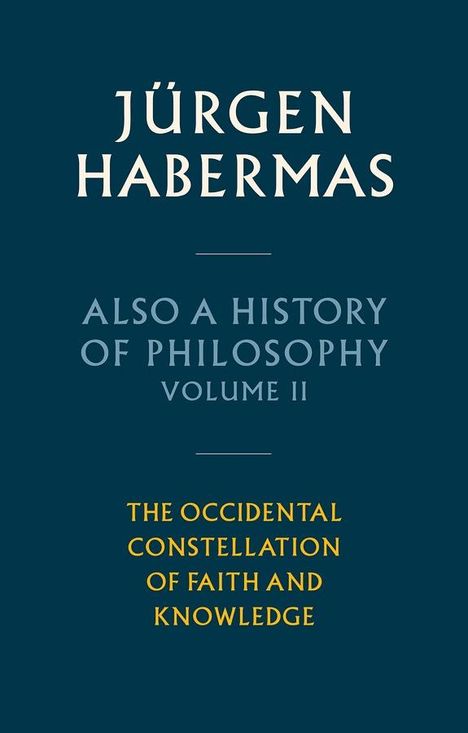Jürgen Habermas: Also a History of Philosophy, Volume 2, Gebunden
Also a History of Philosophy, Volume 2
- The Occidental Constellation of Faith and Knowledge
(soweit verfügbar beim Lieferanten)
- Übersetzung:
- Ciaran Cronin
- Verlag:
- Polity Press, 12/2024
- Einband:
- Gebunden
- Sprache:
- Englisch
- ISBN-13:
- 9781509545179
- Artikelnummer:
- 11933903
- Umfang:
- 592 Seiten
- Gewicht:
- 984 g
- Maße:
- 235 x 163 mm
- Stärke:
- 53 mm
- Erscheinungstermin:
- 23.12.2024
- Hinweis
-
Achtung: Artikel ist nicht in deutscher Sprache!
Klappentext
In this second volume of his groundbreaking new work on the history of philosophy, Jürgen Habermas traces the development of Western thought from the reception of Platonism by early Christian thought, through the revolution in medieval philosophy and theology triggered by the rediscovery of Aristotle's works, up to the decoupling of philosophical and theological thought in nominalism and the Reformation that ushered in the postmetaphysical thinking of the modern age. In contrast to conventional histories that focus on movements and schools, Habermas takes the dialectic of faith and knowledge as a guiding thread for analysing key developments in the thought of major figures such as Augustine, Aquinas, Scotus, Ockham and Luther that constitute milestones in the genealogy of postmetaphysical thinking. A distinctive feature of Habermas' approach is the prominence he accords practical philosophy, and in particular legal and political ideas, and the corresponding attention he pays to social, institutional and political history, especially as these bear on the relationship between church and state. As a result, the central preoccupations of Christian thought are shown to be original responses to questions raised by the Christian worldview that exploded the framework of Greek metaphysical thinking and remain crucial for the self-understanding of contemporary philosophy. Far from raising claims to exclusivity, completeness or closure, Habermas's history of philosophy, published in English in three volumes, opens up new lines of research and reflection that will influence the humanities and social sciences for decades to come.
Biografie (Jürgen Habermas)
Der 1929 in Düsseldorf geborene deutsche Philosoph und Soziologe Jürgen Habermas studierte Philosophie, Geschichte und Psychologie in Göttingen, Zürich und Bonn, wo er 1954 promovierte. Von 1956 bis 1959 war er Assistent am Institut für Sozialforschung in Frankfurt am Main. und nahm dort wesentliche Impulse der Frankfurter Schule auf. Aus ihrer Tradition hat er die seine weiteren Arbeiten strukturierende Fragestellung entwickelt, wie eine kritische Theorie der Gesellschaft beschaffen zu sein habe, die eine dem erreichten Stand sozialwissenschaftlicher Erkenntnis wie historischer Erfahrung angemessene Theorie der Demokratie darstelle. 1961 habilitierte er in Marburg und wurde auf ein Extraordinariat für Sozialphilosophie nach Heidelberg berufen. 1964 erhielt er eine Professur für Philosophie und Soziologie in Frankfurt am Main. 1971 wurde er, gemeinsam mit Carl-Friedrich von Weizsäcker, Direktor des neu gegründeten "Max-Planck-Instituts zur Erforschung der Lebensbedingungen der wissenschaftlich-technischen Welt" in Starnberg. 1982 folgte Habermas dem Ruf nach Frankfurt am Main auf eine Professur für Soziologie und Philosophie. 2001 wurde er mit dem Friedenspreis des Deutschen Buchhandels ausgezeichnet.

